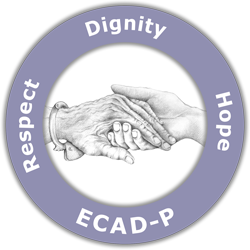
Computer-based Learning for End-of-Life Care in Prisons
In a recent publication in the Journal of Forensic Nursing, authors from The Pennsylvania State University and Klein Buendel describe, in detail, the design and development of a computer-based learning program for geriatric and end-of-life (EOL) care for incarcerated people. The program, called Enhancing Care for the Aged and Dying in Prison (ECAD-P), was funded by a Small Business Technology Transfer (STTR) grant to Klein Buendel from the National Institute on Aging.
Content creation was based on the Phase I Principal Investigators’ paper-based EOL Toolkit. The systematic design and development of the training program was guided by the Institute for Healthcare Improvement’s Framework for Going to Full Scale. The Journal of Forensic Nursing paper describes the painstaking processes of designing a program logo, recording video testimonials, creating graphic novels, incorporating visually-stimulating images, confirming reading level, and programming the functionality of the media-rich, interactive computer-based training program. The final ECAD-P program has six modules which take approximately 2.5 hours to complete in one or more sessions.
The STTR Phase I and Phase II projects were funded by a grant from the National Institute on Aging (AG049570). The Phase I Multiple Principal Investigators, Dr. Janice Penrod and Dr. Susan Loeb, are from The Pennsylvania State University. The Phase II Multiple Principal Investigators, Dr. Susan Loeb and Dr. Valerie Myers, are from The Pennsylvania State University and Klein Buendel, respectively. Other paper coauthors include Rachel Wion from The Pennsylvania State University, Tiffany Jerrod from Klein Buendel, and Sophia Strickfaden from Johnson & Wales University. ECAD-P was programmed by the Creative Team at Klein Buendel.